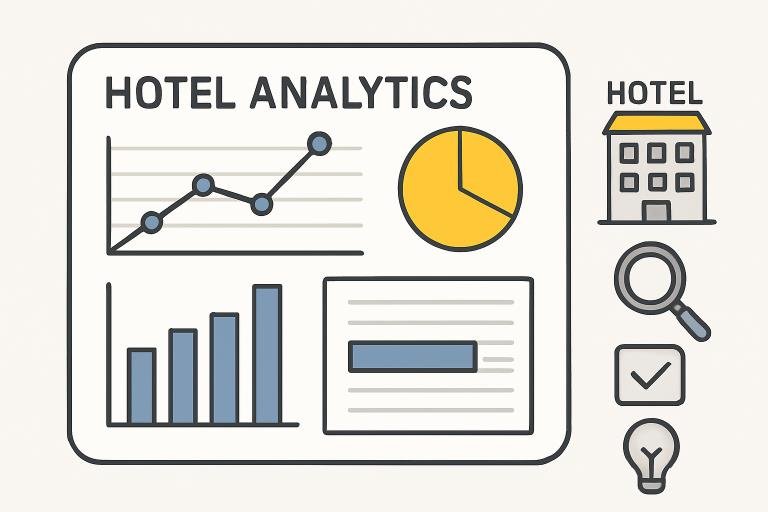In today’s rapidly evolving hospitality environment, making better business decisions requires more than just intuition. Hotels, resorts, and property managers are increasingly turning to robust analytics and digital tools to craft competitive advantages. Leveraging a hotel revenue management system is one of the primary ways forward-thinking businesses optimize pricing, operational efficiency, and guest satisfaction. As data becomes the backbone of every decision, leaders in hospitality are finding new and innovative ways to both delight guests and boost profitability.
Data-driven strategies help hoteliers go beyond guesswork—enabling precision in everything from marketing campaigns to room assignments. With so much at stake, adapting to data-centric paradigms isn’t just beneficial; it’s essential, as guests seek more customized experiences. Properties that intelligently harness analytics position themselves as industry leaders, able to respond to shifting demand and drive consistent financial performance.
Understanding Guest Preferences
Advanced analytics enable hospitality professionals to gain a more comprehensive understanding of their guests, drawn from sources such as previous stays, digital feedback, booking channels, and even social media sentiment. By analyzing this information, properties can create highly personalized guest experiences, which in turn lead to higher retention rates and a more positive online reputation. Delivering on anticipated guest needs also empowers staff to exceed expectations, turning occasional visitors into loyal advocates.
For example, properties are now leveraging review analysis tools to spot trends in guest requests, complaints, or favorite amenities. These insights guide tactical updates—from room upgrades to breakfast menu tweaks or event offerings—ensuring that the property remains competitive and relevant to its target audience. Furthermore, segmenting guests by specific interests or behaviors enables the delivery of tailored promotions and targeted loyalty offers.
Dynamic Pricing Models
Price optimization is no longer a static, spreadsheet-driven function. Instead, sophisticated dynamic pricing algorithms analyze real-time market data—like booking patterns, competitor pricing, seasonality, and local events—to make ongoing adjustments that keep properties competitively priced. Using dynamic pricing not only maximizes occupancy during low periods but also capitalizes on peak demand, ultimately driving higher average daily rates and total revenue.
This approach requires a seamless blend of human expertise and machine learning, as revenue managers set parameters and oversee the algorithms. Hotels that embrace such systems enjoy advantages such as faster response times to market shifts and improved financial forecasting accuracy. Reports from sources such as Revenue Analytics highlight the direct impact of effective pricing strategies on revenue growth, making it clear why analytics-powered decision-making is a best practice in the industry.
Operational Efficiency Through Data
With automation and data analytics working in tandem, operational teams gain actionable insights across departments. Workforce scheduling, inventory control, housekeeping, and energy management all benefit from data-driven planning and management. For instance, predictive models can determine peak times for check-ins, enabling strategic staff allocation that enhances both productivity and guest satisfaction. Monitoring utilities usage and optimizing supply orders based on occupancy forecasts can also significantly reduce waste and control costs.
Personalized Marketing Strategies
Personalization in marketing is made possible by integrating guest data from loyalty programs, website interactions, and third-party booking engines. Properties can craft highly targeted campaigns based on guest preferences, demographics, or booking history—resulting in higher conversion rates. Multichannel engagement, utilizing personalized content, offers, and reminders, becomes the norm, driving direct bookings and reducing reliance on costly third-party channels.
Real-Time Analytics in Action
Relying on real-time analytics enables hospitality professionals to act proactively. Instant access to up-to-the-minute performance data or guest satisfaction scores lets managers refine guest interactions and operational decisions as events unfold. Whether it’s adjusting staffing during a sudden surge in arrivals or identifying potential service gaps through live feedback dashboards, acting in real time separates market leaders from the rest.
Incorporating platforms that provide dashboard views of revenue, bookings, and social sentiment can mean the difference between identifying issues when it’s too late and capitalizing on opportunities the moment they arise.
AI and Machine Learning in Hospitality
Artificial intelligence (AI) and machine learning (ML) are revolutionizing hospitality by uncovering data insights previously inaccessible to human analysts. AI-driven systems help streamline everything from upsell recommendations during booking to predicting guest churn risks or identifying high-value customers for retention efforts. These technologies facilitate a shift from reactive to predictive management, where decisions are supported by unbiased evidence and statistical precision.
Embracing AI requires cultural and structural shifts, including integrating cloud-based commercial tools and retraining teams to use these insights effectively. Hotel leaders who champion digital literacy across teams will find themselves ahead of the competition and better equipped to adapt to future disruptions.
Overcoming Challenges in Data Integration
One of the primary obstacles for hotels today is the fragmentation of data. Disparate property management systems (PMS), customer relationship management (CRM) systems, and central reservation systems (CRS) all collect valuable data; however, if these systems are not integrated, actionable insights are lost. Addressing this challenge means investing in platforms that unify data silos, delivering a holistic view of business performance. Collaborative efforts between IT, marketing, and operations teams are essential to ensure successful implementations.
Future Trends in Data-Driven Hospitality
Generative AI platforms are becoming essential for travel discovery. Guests conduct searches in new and interactive ways, which means hotels need adaptable digital strategies. Companies such as Lodging Interactive are already creating AI-driven tools that enhance guest engagement and automate responses to reviews, allowing them to deliver more timely and relevant experiences.
As technology and guest expectations evolve, properties investing in data-driven solutions will not only survive but thrive. Expect further advancements such as intuitive guest-facing chatbots, real-time language translation, and advanced forecasting to define the next era of hospitality.



